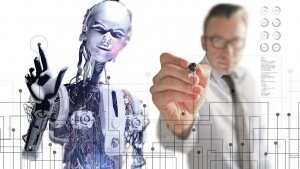
The AGN Global Survey – Global Business Voice
AI and the Entrepreneur
The world is musing over the potential impact of Artificial Intelligence (AI). Forrester predicted “A greater than 300% increase in investment in artificial intelligence in 2017”, and Sundar Pichai CEO of Google wrote in 2016 that;“The last 10 years have been about building a world that is mobile first. In the next 10 years, we will shift to a world that is AI first”.
While computer learning and automation is in its infancy, there are glimpses of how these new technologies will alter work patterns: Amazon Go’s cashier-less supermarket where shoppers take what they want and leave, whilst their Kiva robots move stock around their warehouses. The pairing of AI and “Internet of Things” sensors are carrying out predictive maintenance on machinery across the world. Meanwhile, Uber invests in driverless car technology, in an eerie prediction of the redundancy of its own business model. But what does AI mean for medium-sized businesses across the world? How might their operations be impacted? Are these developments feeding through the typical SME? Welcome to the fifth AGN Global Business Voice. In this edition, we asked our global panel of business advisers how they are seeing AI develop amongst medium-sized businesses. The AGN Global Business Voice (GBV) panel comprises of 44 senior accountancy and business advisory professionals from leading accountancy and consultancy firms across the world.
The nature of work itself will change – goodbye manual labour, hello knowledge based business

The survey predicts a future of reduced costs of production coupled with the availability of experienced resources (people) – with more time on their hands. One possibility is that tectonic shifts in the nature of work will ‘hurry in’ a global level playing field. The developing economies could see an increasing ability to compete as the new wealth creation requires only relatively low levels of capital investment. One can imagine a future where commercial innovation by small business is the bread and butter wealth engine for society, a world of even more consumerism not less, but one where the winners are those cottage industries that constantly create ‘new’ services, products, ideas for others to consume.
The big picture – clouds on the horizon?
Our panel also identified the repatriation of manufacturing from low wage economies as the 3rd ranked effect of AI. This suggests that AI and robotics (often closely allied) will pick up tasks where lower wage economies have historically experienced significant economic benefits. Malcolm Ward – AGN Global CEO: “The panel foresees the progressive abandonment of labour-intensive work by everyone, everywhere. That could be great news if the human workforce can be gainfully occupied in higher value knowledge, creative and relationship-based activities. But it begs the questions, what might these jobs be, and how quickly will they become available? Especially so in less developed economies. One possibility is that higher proportions of the population won’t be working at all, or at least not consistently, and what would be the social implications of that?”
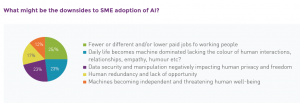
Turning to the question of the drawbacks of AI, it’s clear that the panel is expecting challenging times.
Malcolm Ward notes; “A quarter of the panel think there could be fewer or lower paid jobs for working people, and many are alsoconcerned about daily lives lacking human interaction, relationships and humour. It’s easy to become alarmed, but this probably doesn’t factor in the effect of more time and opportunity for non-work pursuits, such as leisure, social and community activities. Having said that, it probably does not allay the concerns of 23% who think personal privacy and freedoms could be eroded, nor smaller proportions who foresee possibilities of human redundancy or even machine dominance!”
This challenges the first part of the study which suggested SME’s will transform into a knowledge-based business, thriving on innovation and creativity. There appears to be concerns of an employment gap, be it permanent or transient.

When the panel was asked to rank which sectors are most likely to be affected by the emergence of AI, the top 4 were the financial services sector, logistics industry, professional services and manufacturing.
Malcolm Ward remarked: “It’s immediately striking that the panel thinks that all sectors listed are going to be subject to impacts from AI. Of course, banks are already using AI ,for example in detecting fraud, driverless electric trucks are expected to forever change the logistics sector, and in manufacturing robotics already have an enormous role to play.
In professional services, AI is presently about researching, sampling and classifying data, and this is probably just in its infancy. Throughout all sectors, the consistent challenge for businesses appears to harness these efficiencies to reduce the unit costs of services and products, and simultaneously redeploy human resources to still higher value activities. It may be that the former is addressed ahead of the latter, but future business winners may well be those that give balanced attention to both.”

If the business world wholeheartedly adopts AI, what remedial measures might be needed to protect society? 71% of the panel thought the most likely step would be a stricter governance regime around how AI is applied and data is secured and used – perhaps an ethical framework that could curtail some of the more extreme applications and misuse of private data.
Malcolm Ward: “The panel also think it could be a reality that humans will need a guaranteed minimum income. Something that would presumably be paid for via taxation. This might make the next response – the taxation of robots that replace tax-generating human jobs – compelling. But presently only 10% of the panel thought this was a valid strategy.”
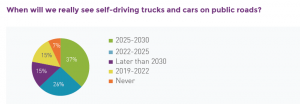
We’re told that the technology for self-driving vehicles already exists, and it’s just a matter of time before we will be whisked along in a driverless taxi, and cargo will be delivered by driverless convoys of articulated trucks. 78% of the panel think this will happen before 2030 and 15% can imagine it within the next 4 years. The major OEM’s are already testing robot HGV trucks on the world’s motorways. Many SME businesses run fleets of vans and light trucks, and research suggests getting these vehicles to safely navigate more complex urban environments, could take longer than 4 years.
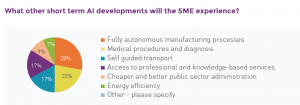
Perhaps predictably, the panel foresee that in the short term the biggest influence for SMEs will be to integrate AI into automated manufacturing processes – perhaps eradicating monotonous low skill or dangerous tasks currently conducted by humans. But this is followed closely by advances in medical procedures and diagnosis, and then other knowledge-based professional services and then transport.
Malcolm Ward remarks: “Medicine is an early adopter of AI. We are already beginning to see the emergence of ‘virtual hospitals’ and the ability to remotely diagnose or even predict conditions using complex algorithms and data mining. While most of these developments have been in the private sector, one can see public hospitals racing to the tech as a way to help reduce their operating costs and reduce risk. This is surely a great opportunity for tech-based SMEs to innovate and grab niche positions built on technology, which these days is far more accessible than in the past. And of course, other knowledge-based professionals are not far behind. We only have to look at AGN members client base to see the huge array of software-based medical solutions that are emerging. Hospital and health offer rich pickings for an AI orientated entrepreneur.”
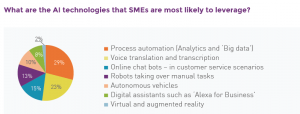
Of the range of AI technologies that are available the AGN global panel see the biggest opportunities for SMEs to be within the analytics and big data field, followed by voice translation and transcription. The cost of obtaining high quality and valuable data falls as the technology to harvest it also becomes cheaper and more accessible.
Malcolm Ward: “Almost all businesses accumulate enormous amounts of information about their clients, suppliers and their own business. Until very recently, penetrating this information has been difficult and expensive, but this is changing. The ability to analyse information, to reveal trends, behaviours, in- efficiencies and trigger events – can open up new commercial opportunities to the SME to sell more, innovate, or streamline processes. Voice recognition and translation solutions mean the opportunities less restricted by language.”
CONCLUSION:
In the short to medium term AI development offers SMEs huge opportunities for business creation and business improvement in a range of sectors. But it does require entrepreneurs to be tech savvy, to keep their eye on the horizon of developments and to work out what applies and what doesn’t. As the change could be so rapid, this might be a threat to the more established business owners.
More broadly there seems to be a contradiction in the results of the survey in terms of the effect of AI on society and SME business. On one hand, the panel predicts a wholesale reduction in manual labour and a shift to knowledge-based working. On the other hand, they can foresee greatly increased leisure time for all. But leisure time isn’t free- leisure time without income can be a euphemism for redundancy. It’s not clear if there will be a ‘jobs gap’ or whether this leisure time will be funded by everyone working less hours. Either way there could be plenty of talented people about with little to do.
Alternatively, and perhaps more optimistically, the answer might lie in humankind’s seemingly endless ability to innovate. If we are looking at a surplus of skilled and knowledgeable people, in an environment of accessible technology at a reducing cost point; surely this is a recipe for creativity.
Malcolm Ward; ‘‘When it comes to the unstoppable natural force of entrepreneurialism, isn’t opportunity the mother of innovation? It is possible that the low-cost tech-rich environment created by AI might spark a business renaissance. A tidal wave of AI, robotics and tech-based business generating new and interesting roles. The fourth industrial revolution?”

